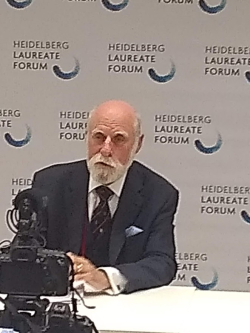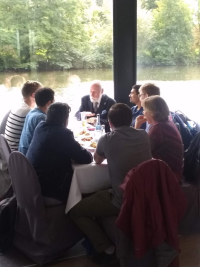
I can’t do it.
Cerf is the most famous name at the Heidelberg Laureate Forum. He accepts that. Wherever he goes he is surrounded by eager young researchers. They come hoping for wisdom but also get lessons in charm, and his full attention. These are important lessons, that if you want to be heard you should listen as well.
Cerf helped design the TCP/IP protocol, 45 years ago.. He is still one of the most vital voices on the Internet and will answer any question asked, at length, and in complete sentences.
Take autonomous cars.
A single car is like a peppercorn, he said. A bunch of them are a peppermill, getting in one another’s way. Things get very complex, very fast.
“Don’t make assumptions about the behavior of systems, especially if they’re large and complex and have many interacting parts,” he said. “There are some airports without controllers. So pilots get on a common channel ad the pilots negotiate with each other. I can imagine self-driving cars taking advantage of these mechanisms to negotiate .”
That’s the way Cerf’s brain works. Every question gets an extended, thoughtful answer, leaving his listeners with much to think about, and wanting more.

Then he was asked about disability. Cerf noted its advantages. He’s been wearing hearing aids since he was 13, and deliberately took jobs where he could use e-mail. Then he said this.
“Anyone, no matter their disability, doesn’t wake up thinking they are disabled. They know there are things they do where they need help, like my hearing aids. But that’s a question of recovering capability to function. So it’s very important for employers to understand their focus is not on their disability but what people can do.
“Many of us will experience disability as we get older. Everyone who has a temporary disability will recognize what they can’t do at that time. The wife of a Turing Award winner was here and both arms had been broken. She was surprised at all the things she had taken for granted that she suddenly needed help for. Thankfully she has healed, but everyone should have that experience so they can understand why assistive technology is helpful.
“It’s embarrassing that we haven’t yet managed to take computers do better in accommodating needs with assistive technology. Better keyboards, larger fonts, there are a wide range of technologies we should be incorporating in all applications. The problem is that most programmers have an intuition of what provides assistance where they haven’t had a disability problem. Systems should be usable by design and that’s a big challenge.”
This was in answer to a single question.
Cerf combines humility with eloquence and depth. He is confident in the quality of his instrument, his ability to teach and willingness to listen. He talked at length about backing up today’s data for future centuries, about plans to extend broadband access around the world with satellites, about bringing more women and people of color to the forefront of science, about the problem of bots and distinguishing them from people. Then there’s the whole question of critical thinking, and how we know so little about the universe.
I didn’t get a chance to tell him this, because it might embarrass him. But the Internet is fortunate to have a spokesman like him, at this time in its history, where wisdom, eloquence, and a willingness to listen are all in short supply. Vint Cerf is a living example of what the Internet can be.









